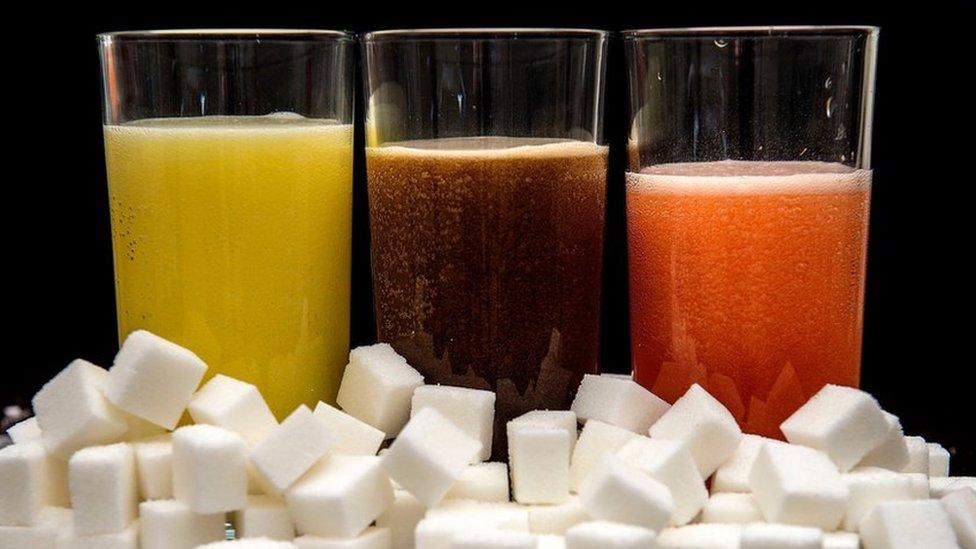Sugar tax: There's more to come in the war on obesity
- Published

It's not the end, there's more to come. That was the message from ministers with the launch of the soft drinks sugar tax.
There was a clear hint that further anti-obesity policies are not far off. The government seems emboldened to press on with strategies aimed at persuading companies to cut calorie content and to wean consumers off their fast-food habit.
First of all, policymakers may well consider extending the scope of the sugar tax to flavoured milk drinks. They were left out of the scope of the levy when it was first announced in 2016.
But the instigator of the policy, George Osborne, when he was chancellor, now says he wishes he had gone further at the outset and included sugary milk drinks in the tax net. He hinted that current cabinet members should move more rapidly.
Speaking to the 91╚╚▒Č's Newsnight, Mr Osborne said: "I was already, before I left office, looking at whether you could extend it to sugar added to milk products like sugary milkshakes. I think it'll be for others to take further steps forward and I would predict those steps will be taken."
In train already is a sugar reformulation plan. This is aimed at products not covered by the soft drinks levy, such as cakes, biscuits and cereals. Manufacturers and retailers have reached agreement with health officials to cut sugar content of these food items by 20% over four years with a 5% reduction in the first year. They can do it either by introducing new recipes or cutting portion sizes.
Public Health England says the results from the first year of this sugar reduction plan are due to be published in May. A stack of market sales data has been assembled and officials are analysing it to work out whether companies in each category are cutting sugar content in line with the target.
It's understood that the sugar content removed by the food and restaurant industries in the first year has fallen short of the required 5%. Better progress has been made apparently by cereal manufacturers than biscuit and chocolate producers. It's a voluntary plan and critics will point out that there are no sanctions for companies which don't hit their targets.
Officials will argue that it's a fair start and the first year was always going to be difficult as the industry changed its production processes to remove sugar. There is optimism that the four-year 20% sugar reduction plan will be successful.
Its going to be a busy year for Public Health England as it has recently launched a calorie-cutting strategy, again involving companies signing up to voluntary targets. This covers pizzas, pies, processed foods and a range of savoury items. The detail has not been worked out and that could yet be a more challenging task than for the sugar plan.
Whitehall is gearing up for a wider child obesity strategy this summer. Theresa May seems to have noted that opposition to the sugar tax has been muted and decided that she can go further than the plan she unveiled in 2016 which was widely criticised as too weak. Back on the agenda are curbs on food advertising during prime time television programmes and restrictions on promotions of high calorie food in supermarkets.
Shoppers, meanwhile, will be getting used to the new sugar tax world. Companies making high sugar drinks will be watching closely to see if their customers are deterred from paying 48p more for a two-litre bottle. Those who have reduced sugar content to come in below the tax threshold will want to find out whether consumers are happy with the new recipes.
Irn-Bru has encountered resistance after moving to a lower sugar version. There have been mutterings on social media that the new version of Ribena does not taste as good as the traditional one.
What will take time is gathering evidence on the impact of these policies. Will they bring down obesity? Will there be unintended consequences? Might any changes in people's health have happened anyway? The debate will continue even though there may not be much data for a while yet.